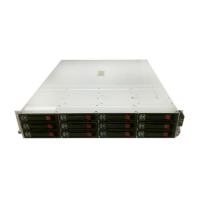Continuous Access EVA with XCS 6.x
This section describes the Continuous Access EVA XCS 6.x data replication specifications and the
supported minimum and maximum transmission rates for qualified switch and gateway pairs. Table
157 lists the network requirements for long-distance gateways that work with EVA XCS 6.x.
Table 157 Network requirements for long-distance IP gateways with XCS 6.x
DescriptionSpecification
• Must be dedicated to the Continuous Access storage replication
function.
• The minimum IP bandwidth required for Continuous Access EVA with
FCIP is 2 Mb/s per path, or 4 Mb/s for two paths when using one
IP link.
• There is no support for dynamic pacing of the gateway.
IP bandwidth
1
See Table 131 for the maximum number of DR groups.
See Table 158 and Table 159 for minimum supported bandwidth and
resulting maximum number of DR groups based on the average
packet-loss ratio and one-way inter-site latencies.
Maximum number of DR groups
1,500 bytesMTU of the IP network
100 ms IP network delay one-way or 200 ms round-trip
Maximum latency
1
Low-loss network: 0.0012% average over 24 hours
High-loss network: 0.2% average over 24 hours; must not exceed 0.5%
for more than 5 minutes in a two-hour window
Average packet-loss ratio
2
Must not exceed 10 ms over 24 hours
Latency jitter
3
1
Pre-existing restriction
2
A high packet-loss ratio indicates the need to retransmit data across the inter-site link. Each retransmission delays transmissions
queued behind the current packet, thus increasing the time to complete pending transactions. Unless noted otherwise, gateways
listed in Table 158 and Table 159 are supported in both low-loss and high-loss networks.
3
Latency jitter is the difference between the minimum and maximum values, and indicates how stable or predictable the network
delay. The greater the jitter, the greater the variance in the delay, which lowers the performance predictability.
NOTE:
Applications typically require more than the minimum bandwidth to meet throughput requirements.
To increase the maximum number of DR groups, you must increase the minimum available IP
bandwidth. For example, if the maximum number of DR groups required is 10, increase the minimum
available bandwidth to 10 Mb/s; for 15 DR groups, increase to 15 Mb/s; and for 128 DR groups,
increase the minimum available bandwidth to 128 Mb/s.
SAN extension328

